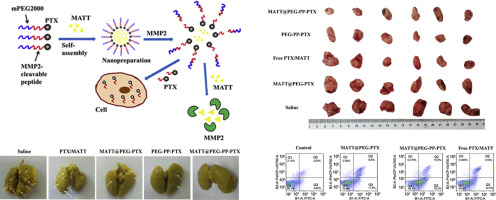当前位置:
X-MOL 学术
›
Powder Technol.
›
论文详情
Our official English website, www.x-mol.net, welcomes your
feedback! (Note: you will need to create a separate account there.)
Matrix metalloproteinases sensitive multifunctional micelles for inhibition of metastatic tumor growth and metastasis
Powder Technology ( IF 4.5 ) Pub Date : 2019-12-01 , DOI: 10.1016/j.powtec.2018.08.045
Chao Qin , Xin Yang , Yubing Wu , Yaqi Lv , Li Zhang , Xiaofei Xin , Lei Yang , Wei He , Xiaopeng Han , Lifang Yin , Chunyong Wu
Powder Technology ( IF 4.5 ) Pub Date : 2019-12-01 , DOI: 10.1016/j.powtec.2018.08.045
Chao Qin , Xin Yang , Yubing Wu , Yaqi Lv , Li Zhang , Xiaofei Xin , Lei Yang , Wei He , Xiaopeng Han , Lifang Yin , Chunyong Wu

|
ABSTRACT A matrix metalloproteinases (MMPs) triggered multifunctional micellar system loading traditional chemotherapeutic agent paclitaxel (PTX) and marimastat (MATT), an inhibition of matrix metalloproteinases, was established to prevent tumor growth and metastasis. The micelles were self-assembled by the conjugate synthesized with an MMPs sensitive peptide as the bridge between PTX and poly(ethylene glycol) (PEG). 4T1 cell line derived from a murine breast tumor was selected as the cell model due to its high metastasis. The cytotoxicity assay and cell apoptosis analysis revealed that the sensitive micelles increased the toxicity and cell apoptosis compared with the insensitive micelles. In addition, this system also exhibited high penetration ability in tumor spheroids and significant invasion inhibition with the method of Transwell invasion assay. In the BALB/c mice bearing 4T1 tumors, this system inhibited the growth of the metastatic tumor and prevented the incidence of lung metastasis with low systemic toxicity. And the expression of MMP-2 and MMP-9, which are important in the process of tumor metastasis, was down-regulated. Generally, the data obtained from the in vitro and in vivo studies confirmed that the codelivery of PTX and MATT by the MMPs sensitive micelles achieved not only significant antitumor effect but also obvious inhibition effect of tumor metastasis, which are the leading cause of cancer deaths. This functional particle system may provide a promising strategy for metastatic breast cancer therapy.
中文翻译:

基质金属蛋白酶敏感性多功能胶束抑制转移性肿瘤生长和转移
摘要 基质金属蛋白酶 (MMPs) 触发多功能胶束系统加载传统的化疗药物紫杉醇 (PTX) 和 marimastat (MATT),基质金属蛋白酶的抑制作用,被建立以防止肿瘤生长和转移。胶束通过用 MMP 敏感肽合成的缀合物自组装,作为 PTX 和聚(乙二醇)(PEG)之间的桥梁。由于其高转移性,选择源自鼠乳腺肿瘤的4T1细胞系作为细胞模型。细胞毒性试验和细胞凋亡分析表明,与不敏感胶束相比,敏感胶束增加了毒性和细胞凋亡。此外,该系统还表现出对肿瘤球体的高渗透能力,并通过 Transwell 侵袭试验方法显着抑制侵袭。在携带 4T1 肿瘤的 BALB/c 小鼠中,该系统抑制转移性肿瘤的生长并预防肺转移的发生,全身毒性较低。并且在肿瘤转移过程中起重要作用的MMP-2和MMP-9的表达下调。总体而言,体外和体内研究数据证实,MMPs敏感胶束对PTX和MATT的共递送不仅具有显着的抗肿瘤作用,而且对肿瘤转移有明显的抑制作用,而肿瘤转移是导致癌症死亡的主要原因。这种功能性粒子系统可能为转移性乳腺癌治疗提供一种有前景的策略。在携带 4T1 肿瘤的 BALB/c 小鼠中,该系统抑制转移性肿瘤的生长并预防肺转移的发生,全身毒性较低。并且在肿瘤转移过程中起重要作用的MMP-2和MMP-9的表达下调。总体而言,体内外研究数据证实,MMPs敏感胶束对PTX和MATT的共递送不仅具有显着的抗肿瘤作用,而且对肿瘤转移有明显的抑制作用,而肿瘤转移是导致癌症死亡的主要原因。这种功能性粒子系统可能为转移性乳腺癌治疗提供一种有前景的策略。在携带 4T1 肿瘤的 BALB/c 小鼠中,该系统抑制转移性肿瘤的生长并预防肺转移的发生,全身毒性较低。并且在肿瘤转移过程中起重要作用的MMP-2和MMP-9的表达下调。总体而言,体内外研究数据证实,MMPs敏感胶束对PTX和MATT的共递送不仅具有显着的抗肿瘤作用,而且对肿瘤转移有明显的抑制作用,而肿瘤转移是导致癌症死亡的主要原因。这种功能性粒子系统可能为转移性乳腺癌治疗提供一种有前景的策略。并且在肿瘤转移过程中起重要作用的MMP-2和MMP-9的表达下调。总体而言,体内外研究数据证实,MMPs敏感胶束对PTX和MATT的共递送不仅具有显着的抗肿瘤作用,而且对肿瘤转移有明显的抑制作用,而肿瘤转移是导致癌症死亡的主要原因。这种功能性粒子系统可能为转移性乳腺癌治疗提供一种有前景的策略。并且在肿瘤转移过程中起重要作用的MMP-2和MMP-9的表达下调。总体而言,体内外研究数据证实,MMPs敏感胶束对PTX和MATT的共递送不仅具有显着的抗肿瘤作用,而且对肿瘤转移有明显的抑制作用,而肿瘤转移是导致癌症死亡的主要原因。这种功能性粒子系统可能为转移性乳腺癌治疗提供一种有前景的策略。这是癌症死亡的主要原因。这种功能性粒子系统可能为转移性乳腺癌治疗提供一种有前景的策略。这是癌症死亡的主要原因。这种功能性粒子系统可能为转移性乳腺癌治疗提供一种有前景的策略。
更新日期:2019-12-01
中文翻译:

基质金属蛋白酶敏感性多功能胶束抑制转移性肿瘤生长和转移
摘要 基质金属蛋白酶 (MMPs) 触发多功能胶束系统加载传统的化疗药物紫杉醇 (PTX) 和 marimastat (MATT),基质金属蛋白酶的抑制作用,被建立以防止肿瘤生长和转移。胶束通过用 MMP 敏感肽合成的缀合物自组装,作为 PTX 和聚(乙二醇)(PEG)之间的桥梁。由于其高转移性,选择源自鼠乳腺肿瘤的4T1细胞系作为细胞模型。细胞毒性试验和细胞凋亡分析表明,与不敏感胶束相比,敏感胶束增加了毒性和细胞凋亡。此外,该系统还表现出对肿瘤球体的高渗透能力,并通过 Transwell 侵袭试验方法显着抑制侵袭。在携带 4T1 肿瘤的 BALB/c 小鼠中,该系统抑制转移性肿瘤的生长并预防肺转移的发生,全身毒性较低。并且在肿瘤转移过程中起重要作用的MMP-2和MMP-9的表达下调。总体而言,体外和体内研究数据证实,MMPs敏感胶束对PTX和MATT的共递送不仅具有显着的抗肿瘤作用,而且对肿瘤转移有明显的抑制作用,而肿瘤转移是导致癌症死亡的主要原因。这种功能性粒子系统可能为转移性乳腺癌治疗提供一种有前景的策略。在携带 4T1 肿瘤的 BALB/c 小鼠中,该系统抑制转移性肿瘤的生长并预防肺转移的发生,全身毒性较低。并且在肿瘤转移过程中起重要作用的MMP-2和MMP-9的表达下调。总体而言,体内外研究数据证实,MMPs敏感胶束对PTX和MATT的共递送不仅具有显着的抗肿瘤作用,而且对肿瘤转移有明显的抑制作用,而肿瘤转移是导致癌症死亡的主要原因。这种功能性粒子系统可能为转移性乳腺癌治疗提供一种有前景的策略。在携带 4T1 肿瘤的 BALB/c 小鼠中,该系统抑制转移性肿瘤的生长并预防肺转移的发生,全身毒性较低。并且在肿瘤转移过程中起重要作用的MMP-2和MMP-9的表达下调。总体而言,体内外研究数据证实,MMPs敏感胶束对PTX和MATT的共递送不仅具有显着的抗肿瘤作用,而且对肿瘤转移有明显的抑制作用,而肿瘤转移是导致癌症死亡的主要原因。这种功能性粒子系统可能为转移性乳腺癌治疗提供一种有前景的策略。并且在肿瘤转移过程中起重要作用的MMP-2和MMP-9的表达下调。总体而言,体内外研究数据证实,MMPs敏感胶束对PTX和MATT的共递送不仅具有显着的抗肿瘤作用,而且对肿瘤转移有明显的抑制作用,而肿瘤转移是导致癌症死亡的主要原因。这种功能性粒子系统可能为转移性乳腺癌治疗提供一种有前景的策略。并且在肿瘤转移过程中起重要作用的MMP-2和MMP-9的表达下调。总体而言,体内外研究数据证实,MMPs敏感胶束对PTX和MATT的共递送不仅具有显着的抗肿瘤作用,而且对肿瘤转移有明显的抑制作用,而肿瘤转移是导致癌症死亡的主要原因。这种功能性粒子系统可能为转移性乳腺癌治疗提供一种有前景的策略。这是癌症死亡的主要原因。这种功能性粒子系统可能为转移性乳腺癌治疗提供一种有前景的策略。这是癌症死亡的主要原因。这种功能性粒子系统可能为转移性乳腺癌治疗提供一种有前景的策略。































 京公网安备 11010802027423号
京公网安备 11010802027423号